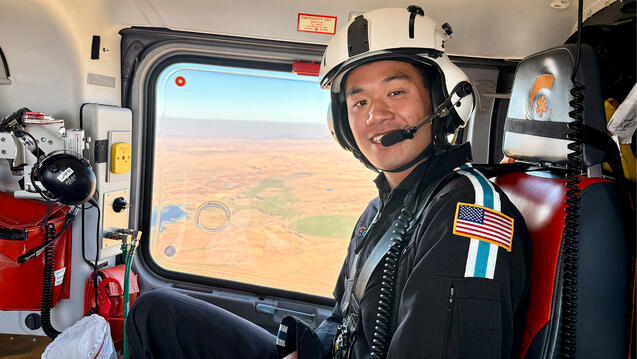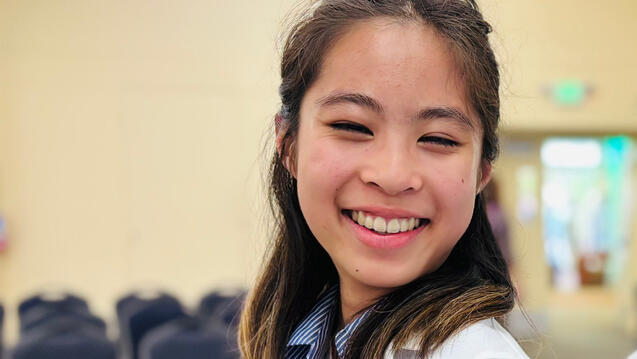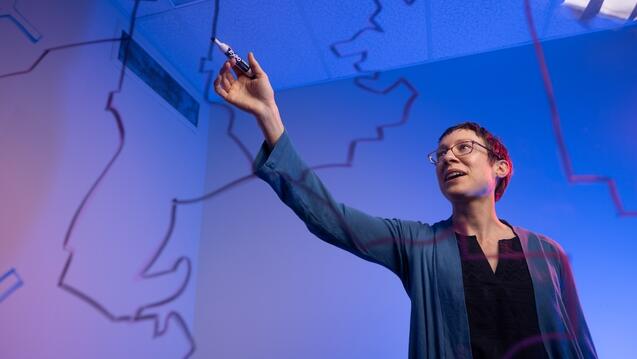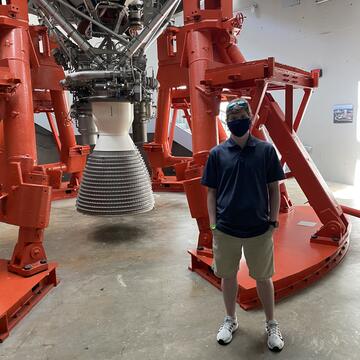
Rockets and Rehab
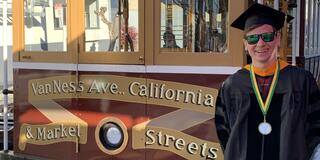
If you asked anyone when I was growing up what career I would end up pursuing, you would probably have never heard of anything to do with healthcare. Those around me would have predicted that I would likely pursue being a lawyer or go into business. So, how did I end up as a psychiatric nurse practitioner?

As best I can tell, my path towards being a nurse and eventually a nurse practitioner started around the beginning of middle school. My mother suffered a strange and unlikely accident during an acupuncture session that was intended to help her manage a lupus flare-up. As she was driving home from her session, her right arm stopped working. It turned out that during her acupuncture session, a needle had ended up puncturing her spinal column. This puncture led her body into an autoimmune response that baffled her doctors for years. She slowly lost efferent control of not only her right arm, but also of both of her legs. She was slowly confined to a wheelchair. While her efferent system shut down, her afferent nervous system revved up. Her nerves screamed out in pain to her brain, but none of her movement commands were able to complete the nerve relay back to her limbs. Watching my mother go from completely independent to nearly immobile in months was terrifying.
My teenage years were heavily influenced by what I was witnessing my mother endure. It would be a fair assessment to say that I was well imbued with a certain sense of teenage angst and more than a fair bit of anger. Both emotions influenced my desire to pursue a career in law after high school. I wanted to do pre-law in undergrad, and then go on to law school right after. I knew I wanted to be a medical malpractice lawyer. I wanted to make the ones that were supposed to heal us pay dearly when they messed up. I did well in high school because I knew I needed the academic accolades to get into a good college and eventually into law school. This is how I ended up at the University of Portland for my undergraduate degree. Richard Rohr, a Catholic theologian, would diagnose this thought pattern with the aphorism, “Pain that is not transformed is transmitted.” I had a lot of pain, and I was happy at the time to envision a career where I would be able to transmit that overwhelming pain. However, something occurred when I decided to go to the University of Portland that would change everything. I had applied to their School of Nursing to be a BSN student when I applied. I thought I was being clever. I would complete a pre-law track while earning a degree in the healthcare field. I thought this would make me stand out in the law school application process. I could just picture the admission committee yawning at a standard pre-law background and moving on to the next applicant. That is how I ended up going to nursing school while simultaneously being on the mock trial team, the president of the student senate, and the vice president of the student body. It was busy, but I was on a mission.
My clever law school plan fell to pieces when I started to enjoy learning about nursing, and I became especially drawn to the idea of trauma medicine. My pain started to really be transformed when I had the opportunity to do a critical care senior practicum in the ICU. This is where I would experience my first code while helping in the emergency department. The experience was visceral, I remember feeling a slight tremble in my hands as my eyes locked on the emergency department technician doing compressions on the patient’s chest. I had complete tunnel vision. The only thing in the world at that moment was that patient. The nurse precepting me put her hand on my shoulder and pulled me back into reality by handing me the cardiac leads. I had a task to do. Something scary was unfolding in front of me, but I didn’t have to be a bystander and watch it helplessly unfold anymore. I realized that I now had the skills to participate in trying to fix everything that was going wrong with the patient. Something deep within me stirred. I needed to work on a team like this. I needed to do things like this every day for work. It set the foundation for my bedside career within the critical care realm. Law school lost its appeal when confronted with the pure adrenaline of emergency medicine. I no longer wanted to make someone pay when something didn’t go right, and instead, I wanted to be part of the team that worked tirelessly to try and prevent things from going wrong in the first place. Nothing else was going to cut it. My pain was starting to transform.
The next several years I had that feeling of tunnel vision in terms of my career. That total focus I first felt standing in that trauma bay expanded into an obsession with being part of the critical care team. I spent time in ICUs and emergency departments honing my skills, being pushed daily by a team of like-minded obsessives. Eventually, the novelty of it all started to wear off a bit. I was hungry for a more significant challenge. This was when I started thinking about grad school. I surprised my colleagues by choosing to pursue psychiatry. In a way, I also probably surprised myself a bit. The thing that really pushed me toward psychiatry was thinking about where the needs were for nurse practitioners. On a contract at a critical-access hospital on the rural Oregon Coast, I was blown away at the number of kids coming in on mental health holds for suicidal ideation with intent. I watched kid after kid being underserved as the community simply did not have psychiatric resources. If I was going to go back to school, it had to be for a reason greater than just being ready for something different. Those kids became my reason for choosing psychiatry. I was watching the system continuously fail them. I finally had my reason. I was angry again, but by that point I knew the way to best harness that anger was to transform it. I quickly found looking into DNP programs that USF shared my belief in the power of transformation. I applied to USF’s DNP-PMHNP program, and I was thrilled when I was accepted. When I sum up my great takeaways from the DNP program at USF, I come away with two words: rockets and rehab. I was in no way that interested in anything to do with addiction, and I knew next to nothing about what was going on with rockets when I first showed up to USF in 2019. Today, I am leaving the university obsessed with both. Now, I am sure many of you are wondering how in the world addictions medicine and the rocket industry could possibly be linked. It’s a fair question, and I ended up finding the answer to that question by becoming obsessed with the rural-telehealth conundrum as part of my DNP project.
The rural-telehealth conundrum is an academic idea that notes the strange trend that where telehealth is needed the most in rural communities is where the technology infrastructure cannot support telehealth. These were those kids that I saw on my last contract. They were the result of this conundrum. My DNP project dove into trying to figure out how the conundrum could finally be solved. I stumbled upon an article at the beginning of the pandemic about a Native American tribe in Washington State using Starlink internet to quickly usher in telehealth to the reservation. What was Starlink? I found out it was SpaceX’s low-Earth orbit satellite internet service that would soon be commercially available. It turns out the rocket industry had found a more effective way to do satellite internet due to SpaceX having developed a rocket, the Falcon 9, which had a reusable first stage. Low-Earth orbit satellite constellations require a large number of small satellites compared to traditional internet satellite services based in geostationary orbit. That is a lot of space talk, so let me summarize. Low-Earth orbit internet is faster and has less latency than the more traditional geostationary satellite internet. Low-Earth orbit satellite internet offered a solution to the rural-telehealth conundrum.
Now, I had an idea to run with. I just needed a rural place that would be willing to entertain the idea. Dr. Curtis, the head of our NP programs here at USF, let me run with my DNP project at the clinic where she works, Granite Wellness, in Grass Valley, California. Granite Wellness is a clinic system that focuses on addictions. This place was my introduction to a way of delivering care that I had never considered before. I was nervous about working with addicts, as I had a jaded opinion of them from my hospital experiences with them. They were our frequent flyers, and we rarely got feel-good outcomes with them. The tragedy of addiction makes it so easy to want to avert our eyes and turn our attention to areas where a positive emotional return on investment seems more likely. However, I quickly found with these patients that they all had a story to tell. These stories brought to mind my own experience with the power of pain, and our path as humans in either transmitting it or transforming it. Addiction is especially cruel because the pain it causes to be transmitted harms everyone in its vicinity, including the person struggling with the addiction themselves. Sobriety is often measured in the number of days since last use, whereas I have come to see sobriety as a state of transformation that enables hope for a life worth staying sober for. This idea really connects to the Jesuit idea of care of the whole person. Looking at the whole story allows for the person in front of you to stop being just a diagnostic code or a societal problem.
Besides falling in love with recovery and addiction medicine, another area of delight that I stumbled into while at USF was teaching. I had not given much thought to teaching within nursing when Dr. Curtis approached me with an opportunity to teach a class in the BSN VA program at the Sacramento campus. I was a little hesitant at first, but I had always enjoyed being a preceptor during my bedside nursing career. I figured I’d be able to figure it out for at least a semester. I taught an evidence-based practice class and ended up with a fantastic cohort of students. Their excitement around anything and everything to do with nursing was contagious. We worked together as adult learners to build the curriculum towards a growth mindset. I wanted the students to learn evidence-based practice, but I really wanted their greatest lesson from the class to be the ability to trust themselves and their abilities. Failure can be terrifying, but the growth mindset teaches one to pursue their absolute capacity even in the face of potential failure. The students pushed themselves to their limits, and the quality of their work improved exponentially throughout the semester as they continuously surpassed their initial self-imposed limitations. I have absolute faith that every single one of these students will be an excellent nurse in just a few short semesters. They are still learning just how much they are capable of, and they will change the profession and the world as they come to fully recognize just how incredible they are. It will be a moment of enormous pride for me when they graduate and transition to being nursing colleagues. That class of students inspired me to remain in education, and I will be staying on with USF as a psychopharmacology professor in the PMHNP program. I am humbled at the thought of continuing to work with the inspiring, incredible students here at USF.
I have been blessed to have had a formative experience throughout my time in the DNP program here at USF. I would be remiss not to mention how I have been able to get so much out of the program. Whatever I have achieved at USF, it has been done while standing on the shoulders of giants. Some of the giants upon whose shoulders I have stood are Dr. Trinette Radasa, Dr. Alexa Curtis, Dr. Joan Fraino, Dr. Doug Williamson, Dr. Neal Mehra, Daisy Klith, Gabriel Ramirez, Virgil Hart, Katie Helton-Potts, Steve Black, my classmates, my students, and my incredible friends and family. This journey would have been impossible without them, and I am forever grateful for all that they have given me. Any future success that I may go on to have will be built on the foundation that they and USF have provided me over the last few years. If I make any positive changes in the world, it will be because I am graduating USF a changed person. A person for others. A person that delights in the disparaged, the forgotten, the downtrodden. A nurse practitioner.
Go Dons!
